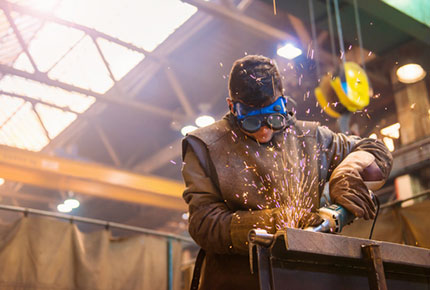Institutions must encourage growth in manufacturing, say LAU economists
Business professors Ali Fakih and Mahmoud Araissi tackle regional economic problems.

Given the high unemployment rates in the region, Arab countries may well be inclined to follow the Chinese model and invest in labor-intensive manufacturing, the economists say.
“The manufacturing sector is very weak across the whole of the MENA region, and exports are low,” says Ali Fakih, explaining the motivation behind a recent study he conducted with fellow financial economist Mahmoud Araissi. The two assistant professors of LAU’s Adnan Kassar School of Business analyzed information from a World Bank Survey to explore correlations between government institutions and the manufacturing sector in Arab countries.
“Weak infrastructure is definitely a key problem, with producers having to spend extra money simply to ensure they have enough electricity and water,” explains Araissi. Another key constraint to new business, he adds, is rigidity in the process of establishing a business. “In the States you can open a business in one day, in Lebanon it can take 45 days.”
The academic paper resulting from their analysis was published this month in the International Journal of Social Economics. A shorter version, written in the form of a policy paper, can be read on the Arabic research website Khamsoon. “The portal tries to explain the importance of economics to people in the Middle East in layman’s terms,” says Fakih of the venture.
An introductory video on the Khamsoon website highlights the importance of growth in the manufacturing sector in remedying growing unemployment in the region – the highest in the world according to the International Labor Organization and the International Monetary Fund. Fakih agrees with the video’s premise. “A strong manufacturing sector will increase export rates, lead to job creation, and attract foreign direct investment to the region.”
Despite political instability in the area, Araissi believes that foreign investors may be lured if institutions are strong and predictable. “Institutions regulate governance, labor law, the management of scarce resources, the transfer of profits, and other factors relevant to foreign investors,” says Araissi. “Political stability is important, but less developed countries in Africa, such as Kenya, have succeeded in attracting foreign investment,” he adds.
Araissi and Fakih have recently completed a separate study focusing on Kenya. “We investigated their financial growth nexus,” explains Araissi, whose specialization is in finance equity and banking. “They’re doing very well there, improving their financial market. It’s a country that other African nations can take as a model.”
According to the economists, cheap labor, close proximity to Europe and public coverage of electricity explain why Morocco stands out as a strong model for manufacturing in the MENA region: “They export high-tech products to the EU that are capital intensive, using machines, while Gulf countries still rely on oil exports while others, like Egypt and Syria, export textiles, which is very labor intensive.”
Given the high unemployment rates in the region, Arab countries may well be inclined to follow the Chinese model and invest in labor-intensive manufacturing. “Egypt has the labor and the land for it, and enjoyed a healthy textile industry before Nasser. After he began nationalizing factories and businesses, the country witnessed a lot of capital flow out of industry,” says Fakih.
The relationship between political change and industry and investment is one Fakih and Araissi intend to analyze further in their next collaborative research project. “We will be investigating the affect of the Arab Spring,” says Fakih, a specialist in development economics and econometrics. “It’s time to publish about MENA economies now. There are a lot of problems, conflicts and variations.”
More
Latest Stories
- A Cardiovascular Conference to Streamline National Expertise
- Aspiring Engineers Compete for Scholarships at LAU
- The School of Engineering Delivers Immersive Learning Experiences
- Consultants in the Making
- LAU Marks Rare Disease Day With a Call for Collaboration
- First Pulsed-Field Ablation in Lebanon Takes Place at the LAU Medical Center
- LAU New York Becomes a Degree-Granting Campus
- Health Science Students Win at the Annual Colorectal Awareness Walkathon

